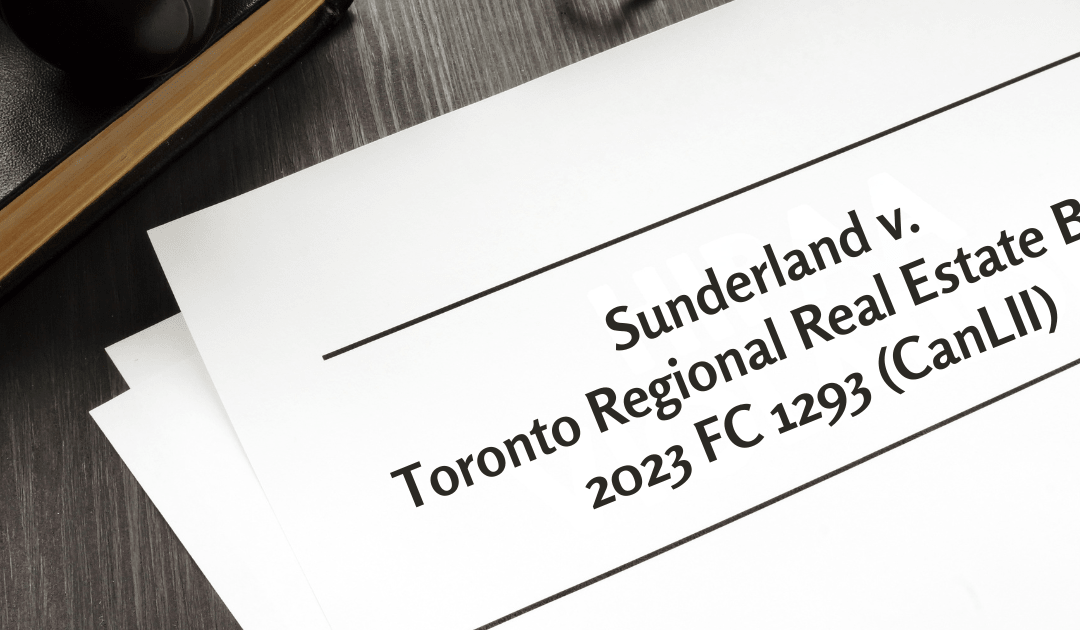The recent Sitzer/Burnett v. National Association of Realtors (NAR) case in the U.S. has forced significant changes in how buyer agents receive commissions. NAR settled the case to avoid an “existential” financial threat (more than $5-billion), agreeing to remove compensation fields from MLS listings and make other adjustments.
Months after the settlement, multiple studies—including recent data from Accountech—suggest that these changes have had no measurable impact on buyer-side commissions.
Despite media coverage portraying the lawsuit as a game-changer, commissions in the U.S. have followed the same gradual downward trend seen for years. The absence of an explicit commission field on MLS databases may slightly reduce “steering”—where agents avoid showing properties offering lower commissions—but it hasn’t fundamentally altered market dynamics.
Given this, what does this mean for Canada’s Sunderland v. Toronto Regional Real Estate Board (TRREB) case?
Sunderland: The Canadian parallel
Sunderland v. TRREB is being closely watched as Canada’s version of the U.S. litigation. Though the case directly involves only TRREB and its associated brokerages, its outcome could have nationwide implications, as real estate boards across Canada follow similar rules regarding cooperating commissions.
Under current TRREB rules, listing brokerages must offer some form of commission to cooperating brokerages—even a nominal amount like $1. The lawsuit argues that these rules encourage “steering” and amount to price-fixing. In late 2023, Chief Justice Paul Crampton ruled that the case had enough merit to proceed to trial. Appeals were heard on Oct. 7 and 8 2024, but the court has yet to issue a decision, which is expected sometime in early 2025.
What did TRREB argue at the appeal?
For TRREB and the defendant brokerages, the best possible outcome would be outright dismissal. Among other things, the defence argued that:
- While individual brokerages may engage in anti-competitive behaviour, TRREB itself is not a competitor in the market and thus cannot be liable.
- The lawsuit effectively suggests that simply joining TRREB—or any real estate board—makes an agent a price-fixer, a claim the defence called a “vast, amorphous conspiracy.”
What did the plaintiffs argue?
The plaintiffs counter arguments included:
- If associations were exempt from competition laws simply because they don’t directly compete with their members, businesses could create associations to draft anti-competitive rules without consequence.
- TRREB’s rules keep buyer-agent commissions artificially high. They pointed to data suggesting that fewer than 1 per cent of commissions offered to buyer brokerages fall below the industry standard of 2.5 per cent.
What happens next?
The court could overturn Justice Crampton’s decision, effectively ending the case. Given Canada’s tendency to follow U.S. legal precedents, a dismissal seems unlikely. Even if Sunderland is halted, similar lawsuits—such as McFall v. Canadian Real Estate Association et al—could continue.
If Sunderland goes to trial, the case against TRREB appears to face significant challenges. While “steering” exists, it is unclear whether TRREB’s commission rules are responsible for it. Even Crampton acknowledged the case’s weaknesses, calling its reasoning “novel but arguable“—hardly a ringing endorsement. However, further legal discovery could bring new evidence to light.
Could TRREB settle?
If TRREB and its allied brokerages determine that the financial risk of losing at trial is too high, they may opt for a settlement similar to NAR’s. But what would that mean for Canadian real estate?
If the U.S. experience is any indication, changes to MLS systems—such as removing the cooperating commission field—will not significantly impact commission rates. Structural market forces, not MLS data fields, are the real determinants of commission trends.
Ultimately, if Sunderland results in a settlement or verdict forcing changes similar to NAR’s, the most likely outcome is that TRREB and other boards pay a potentially substantial financial penalty—while commission rates continue evolving at their own pace, just as they always have.
In short, Sunderland will have been a lot of sound and fury over nothing.

Mike Murphy is a researcher for Moranis, Murphy, Haider (MMH) Consulting. Before that he was the long-time Manager of Research, Data Integrity, and MLS Services at the Toronto Regional Real Estate Board, where he designed many of TRREB’s flagship statistical reports, wrote research papers on innumerable topics, and helped build the Board’s PropTx System. He remains a keen observer of the Canadian and North American real estate scene.















Well done Mike! You’ve really broken down the complexities of the Sunderland v. TRREB case with clarity.
Why doesn’t the issue of fiduciary duty on the part of seller brokers and buyer brokers ever come up in these discussions?
Bruce, now that buyers in the USA have to pay for the services of their own agent, fiduciary duties will be thrust into the spotlight. Who really thinks that a buyer will agree to pay their agent 2.5% for a home that is listed by their agent, or a member of the same sales team, or a member of the same brokerage? Sunderland is just the tip of the iceberg.
Keen observer !
Thanks for the reminder of the details concerning this pesky coattail law suit.
Looking for a settlement to ‘just go away’
In your article, The Plaintiff states “TRREB’s rules keep buyer-agent commissions artificially high. They pointed to data suggesting that fewer than 1 per cent of commissions offered to buyer brokerages fall below the industry standard of 2.5 per cent.” THAT is their language while knowing there is no “industry standard”
Unfortunately sunderland reads commission as a fixed rate
Whereas it’s an agreement between the parties involved and negotiable
For that matter he could sue Walmart for percentage of profits on products because he feels it’s not right
As I’ve been saying to NAR groups and colleagues, the commission fields could simple be removed and replaced with “Brokers Protected- Yes or No”. It will involve one additional call/email to get the information Agree or Disagree?
Exactly!
Isn’t listing a commission the same as any retailer adding a price ticket to any item? That price is never a firm, set in stone price. It often gets voluntarily discounted during sales and purchases. In many cases commissions are also renegotiated in putting deals together by agents for their clients’ benefits. Saying that the commissions are always set to what is listed is otherwise just false.
Buyer agents need to be paid -= it’s sad and tiring seeing people trying to make an end run avoiding pay to agents – do buyers cut their salary or work for nothing?